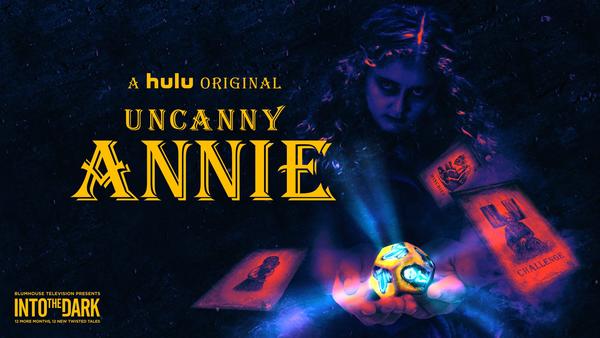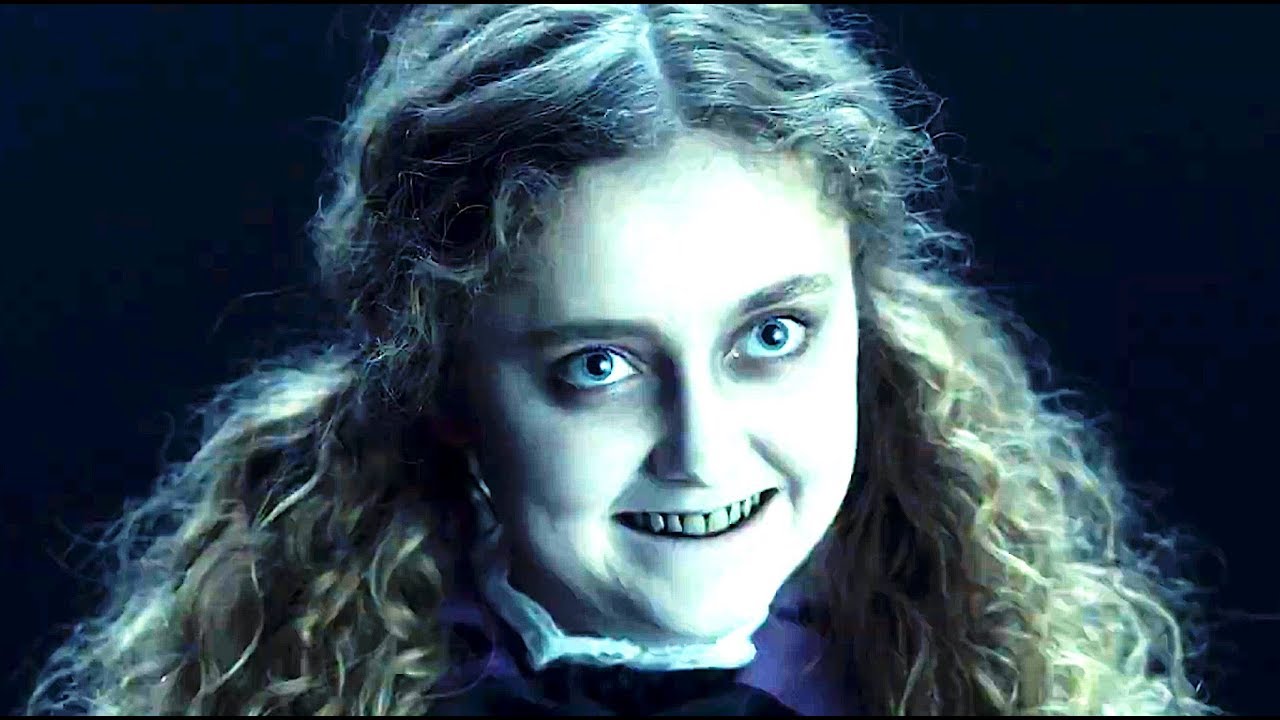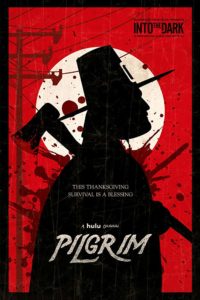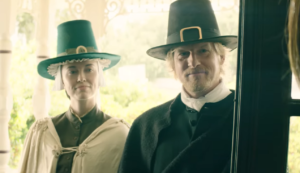Hello! Here we are, back again, with season two of Hulu and Blumhouse Productions collaborative anthology series Into the Dark. Last time I reviewed all the episodes in two big chunks (which, if you’re curious, can be found here and here), but this time, I’m planning to tackle them on a monthly, or bi-monthly, basis. So, once more unto the breach, dear Chicers!
As with season one, these reviews are both fat and spoiler free!

I gotta give it to them; Into the Dark is keeping it tight with their promotional images.
Episode 1: Uncanny Annie (October/Halloween)
Written by Alan Blake Bachelor and James Bachelor
Directed by Paul Davis
Ever wonder what it would be like to play a twisted, murder-y version of Jumanji, one that’s controlled by Moaning Myrtle’s deranged American cousin? Well, wonder no more!
The premise of this first installment in the second season of Hulu’s Into the Dark anthology series is about as basic as they come, horror-wise. A group of college-aged friends decide to get together for a small Halloween house party. The reason being, their friend died the Halloween before, so they’ve chosen to celebrate a quiet game night rather than have an all-out bacchanal.
Within this group of friends, you’ll find all the usual suspects. The lovey-dovey couple. The estranged couple. The newcomer. The jock, the nerd, the freak. It’s an array of characters straight out of a John Hughes or a Kevin Williamson movie (writers of films such as Ferris Bueller’s Day Off and Scream, respectively). I mean, if their movies had had a little more racial diversity. There is, of course, tension in the group over a terrible “secret,” something awful that happened the night their friend died. I’m not going to give that “secret” away here, but if you don’t guess it within the first ten minutes, then a) you’re paying more attention to your phone than the episode, or b) this is literally the first horror movie you’ve ever seen. In which case, hi! Welcome to the genre!
At any rate, the friends come together, and before the game, they all play their parts. There’s awkwardness between the estranged couple. Whispered conversations in the kitchen. Teasing of the outcast, portrayed in this episode as the annoying philosophy student, and a casual airing of fears that surely won’t come back to haunt anyone once the game begins. Or will they?!
Speaking of the game, Uncanny Annie is found in the basement of the house. None of the friends have ever seen it or played it before, and its presence is attributed to the previous renter (some weird dude, naturally). They read the directions — which, as one of the characters points out, are basically the exact as those of Jumanji — and decide to play it anyway. Because, of course they do.
If you’ve never read Chris Van Allsburg’s book or watched the two film adaptations, the rules are simple: You must follow the directions and, once a game is begun, IT WILL NOT END UNTIL SOMEONE WINS. (That rule is in all-caps in the book, and I don’t remember, but I assume it’s in all-caps in the show.)
Is the game creepy? Are the challenges unsettling? Is the reveal of the friends’ “secret” excruciatingly slow? Yes, yes, and yes. Where I will give Uncanny Annie points is for the eventual appearance of the titular character. The actress who plays Uncanny Annie, Karlisha Hurley, is the only real standout. She has a look that rests in the valley between child and adult, and everything, from her voice to her terrifying grin and gleeful stare, is delightfully scary. Honestly, it made me wish the character/actress had been saved for a better episode.

Karlisha Hurley killing it as Uncanny Annie (Annie is totally related to Moaning Myrtle. Am I right or am I right?)
Regardless, the game predictably plays out with the direst of consequences, and the ending… well, without giving it away, I’ll simply say that it feels like it goes too far. There’s a fine balance required for the end of any horror movie, and, unfortunately, this one tips the scale toward the negative. Let’s just say that not everyone gets their just desserts, and that falls out in a way that feels pointless and petty rather than pleasurably twisted or ironic.
Finally, unlike a lot of the first season’s episodes, Uncanny Annie doesn’t feel like it has anything interesting to say about society or anything new to add to the genre. True, there can be pleasure found in a classic retelling done well, but this is not that.
Overall: 3 out of 10

Episode 2: Pilgrim (November/Thanksgiving)
Written by Marcus Dunstan and Noah Feinberg
Directed by Marcus Dunstan
Let me just start by saying that fanatics of any stripe freak me the fuck out. Blind devotion to anything terrifies me because it can’t be refuted or reasoned with. So, had I been in England in the seventeenth century, I definitely would have been standing on the dock, watching the Mayflower depart for the “New World,” sighing with great relief. Because Puritans? Those buckle-happy masochists were straight crazy. (Exhibit A: The Crucible. Exhibit B: The VVitch. Exhibit C: Pretty much everything they did, said, wrote, and wore. The prosecution rests, Your Honor.)
Just as an FYI, Pilgrim doesn’t focus too heavily on the religious aspects of the Puritan lifestyle. I mean, it’s there because those cone-hatted zealots brought God into just about everything, but this episode is more about Thanksgiving, both the holiday and the act itself. (Fun fact: Puritans actually celebrated days and sometimes weeks of giving thanks — days of prayer — for all kinds of things, like military victories, ends of droughts, plentiful harvests, etc. Thanksgiving, with a capital T, wasn’t really a thing until George Washington declared it a holiday at the behest of Congress in 1789 and didn’t become a national holiday until 1863, when Abraham Lincoln put his own stamp of approval on the whole thing.)
But, back to Pilgrim. Basically, try-hard mom Anna (Courtney Henggeler) sees a flyer advertising an old-school Thanksgiving experience, one where reenactors come to the house and show everyone what it was like to celebrate the first Thanksgiving. Because she feels detached from her day-trader, always-on-his-tablet husband and her surly stepdaughter, she books them for her family.
When she announces this, stepdaughter Cody (Reign Edwards) and her half-brother Tate (Antonio Raul Corbo) — the only member of the family for whom Cody has nothing but love — react with disgust and surprise, respectively. There follows a brief discussion regarding the holiday and, since the family has had a whole roast chicken for dinner, the father sets down his phone long enough to dig out the wishbone and give it to his kids, instructing them both to make a wish. Cody ends up with the larger half of the wishbone and her hope is for the whole Pilgrim plan to blow up in her stepmother’s face.
Side note: You may recall me mentioning Kevin Williamson in Uncanny Annie. Well, Williamson not only wrote three out of the four Scream movies, he was also the series creator and a writer for Dawson’s Creek. What does that have to do with this review? Well, the dad in Pilgrim is played by none other than Kerr Smith. You know, Jack McPhee from Dawson’s Creek! Yes, he plays the dad. Of a seventeen-year-old. And it’s totally believable.
I suddenly feel very old.

Anyway, a couple of pilgrims show up early, looking for a place to settle in before the others arrive and the real fun begins. It’s a husband-and-wife team, and — this is a little confusing, but stick with me — the husband stays at Cody’s family’s house, while the wife goes to stay at Cody’s boyfriend’s house. The pilgrim wife’s help is a “gift” from Anna, due to Cody’s boyfriend’s lack of a father and his mom’s depression, anxiety, and/or alcoholism. But the way Anna offers this “gift,” with enough passive-aggressiveness and single-mom shaming to kill a cow, had me looking forward to her quick and ugly demise.
At dinner that evening, Cody mocks the male pilgrim reenactor, corrects the pilgrim’s use of the term Indian — First Nations Peoples — and then asks if she can have dinner at her friend’s house because they’re hosting a Nazi reenactor. And…well, I don’t know how I feel about that comparison. Yes, the pilgrims were cuckoo for Cocoa Puffs, and, sure, they did eventually contribute to a slow-burning genocide that, even now, continues to impact a disaffected and dwindling population. So, okay. I suppose Cody’s comparison is fair enough. The thing is, though, despite the fact that Cody is biracial, beyond her verbal zingers, the filmmakers don’t actually explore all of the negative impacts the Puritans’ migration had on the development of our nation. To be fair, there are allusions made in both the opening and closing credits, and there are a few moments when the soundtrack is comprised of modern Christian music, but none of these disparate parts are ever brought together to form a whole.
Anyway, turns out the pilgrims are bat-shit, and before too long, all hell breaks loose. But, like, in a really weird way. The tone of the episode shifts from eerie to darkly humorous to surreal with a randomness that’s very hard to follow. Also, it’s never established if the pilgrims are modern-day Puritans, possessed actors, or corporeal figments produced by Cody’s wishbone wish. Hell, they could be all of the above for all we know. This ambiguity is somewhat resolved by the end of the episode, but not in a way that’s particularly satisfying.
Oh! I almost forgot, but the filmmakers claim that this story is “mostly” based on true events. Their evidence is a photo, with a family tricked out in clothes from the late 1970’s or early 1980’s and a costumed pilgrim standing in their midst. While I’m sure reenactors did, and still do, go around acting out the struggles and triumphs of the Puritans, I find it very hard to believe that this murderous tale bears no more than the slightest whisper of truth.
Point is, I suppose that, as with Uncanny Annie, I was hoping for more from Pilgrim. And perhaps that’s on me as a viewer. But, because almost all of the episodes in season one of Into the Dark had at least a little something to say about the larger world — while others, such as Treehouse, Culture Shock and Pure, had a lot to say — I guess I expected season two to carry on in the same vein.
However, even if you’re simply looking for gory, creepy, escapist horror, there is better stuff out there. Let us bow our heads and hope that, in the future, this season of Into the Dark provides.
Trigger warning: This episode does depict Puritanical acts of torture that some viewers, like myself, might find disturbing.
Overall: 2 out of 10

No Comments